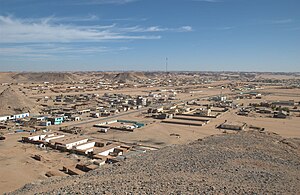
Wadi Halfa is a town on the shores of Lake Nasser in the north of Sudan. It marks the point of entry into Sudan for those coming in from Egypt. It is surrounded by the dunes of the Nubian Desert, the eastern edge of the Sahara, and has a population of around 15,000.
Understand
[edit]Historically, Wadi Halfa was Nubia's most important trading point, being the gateway between Egypt and Sudan. Today the city's buildings are immaculate, surrounded by the golden dunes of the Nubian Desert. It is the stereotypical border town, small and full of paperwork, hassle, and dirt.
The town is actually the new Wadi Halfa; the original Wadi Halfa was submerged when the Aswan High Dam created Lake Nasser in 1971. Sudan's military dictatorship forcibly removed the approximately 50,000 inhabitants of the area from their lands and relocated to the desert, where many died of malaria and other diseases. A few Wadi Halfans, however, remain along the Nile, the river that built their ancestors' identities as fishermen and river traders, building new settlements several times and finally settling on the current location when the flooding stopped. Seasonal flooding still occurs.
Travelers may wish to visit the ancient archaeological sites of Nubia before they, too, are submerged by a series of dams under construction which threaten Nubia's remaining pyramids, which predate those of Egypt.
Get in
[edit]By plane
[edit]- 1 Wadi Halfa Airport (WHF IATA). There are no regular flights to the small airport however Sudan Airways have services from time to time.
By boat
[edit]Most people arrive in Wadi Halfa by the weekly ferry from Aswan across Lake Nasser in Egypt. South-bound departures are on Mondays and north-bound on Wedesdays. 2 The ferry docks at the Customs and Immigration terminal 5 km outside city centre. A sand track leads from the terminal to town, and several vehicles wait at the terminal, touting for business. It is also possible to walk or take a bicycle into town.
By train
[edit]Timed with the ferry is a supposedly weekly over-night train from Khartoum via Atbara, however note that this train is prone to cancellation, make sure to check beforehand that it is running. Journey time is 48 hours. The very rudimentary 3 Wadi Halfa railway station is just west of the settlement. The nearest train station having reliable train schedule with the capital is in Atbara, 900 km south of Wadi Halfa.
By bus
[edit]The road crossing from Egypt periodically closes, but in all other times there is a bus running from Aswan (12-13 hr), passing Abu Simbel.
From Khartoum there's a fast A/C bus making the journey in 12 hr (10 hr in the best case).
Minibuses reach Dongola in 6 hr, and Karima is 2.5 hr further away.
By car
[edit]Also boxes (Toyota Hiluxes) are readily available for rental. If travelling south to Akasha with your own vehicle, note that this is a 145-km stretch (local maps are wrong) and there is only one place with water along the way, just before Akasha.
Get around
[edit]Wadi Halfa is a relatively small town and can be easily explored on foot. Another option is to borrow a donkey, which is the transport of choice for many Wadi Halfans.
See and do
[edit]
Buy
[edit]The shops and market in Wadi Halfa are substantially better stocked than other small towns to the south, getting most of their goods directly from Egypt. There is an excellent food market just beside the main square that opens early some mornings.
Eat
[edit]Almost all the eateries are based around the main square and most offer a choice of "fuul" (beans) with bread or fried Nile perch with bread. Many of the restaurants and shops only open for the two days after the ferry arrives.
Drink
[edit]Alcohol is illegal in Sudan. All of the eateries around the main square serve tea, and Wadi Halfans, Egyptian tradesmen and tourists tend to gather there for a few cups to watch the world go by.
Sleep
[edit]For most of the year, there are several hotels in Wadi Halfa, although after the rains, many close for repairs. All are similar, offering string beds, bucket showers, mud floors, a courtyard and clean rooms. Many have no signs so ask around.
- 1 Nile Hotel (opposite the bus parking lot), ☏ +249 251822049. Offers the same basic service as the others hotels in town. Visited by Michael Palin back in 1991 during his Pole to Pole journey.
Stay safe
[edit]Sudan is a nation in turmoil. The U.S. State Department has had travel advisories in effect for Sudan for several years and counsels U.S. citizens to remain close to the capital city of Khartoum, to avoid travel at night and to conflict areas, such as Darfur, an area of ongoing conflict.
Still, tourists planning to travel independently and off the beaten track (i.e., not going straight to Khartoum), will require a Permit To Travel in Sudan. Obtaining one from Wadi Halfa's police station will likely take the best part of a day.
Wadi Halfa is likely the safest city you will find in Sudan in terms of safety, violence, disease and crime, but beware of the extreme heat, which can be extremely dangerous and seeing 50°C on the thermometer is a normal thing, where temperatures can go up to 54°C, making one of the hottest cities in the world, avoid travelling to Wadi Halfa at all costs during the Summer or even outside of the 'Winter' and closer periods, and even in those periods, use protective clothing and sunscreen.
Go next
[edit]- Abu Simbel and Aswan (Egypt)
- Merowe


